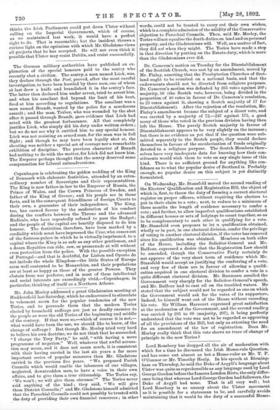On Wednesday, Mr. Stansfeld moved the second reading of the
Electors' Qualification and Registration Bill, the object of which is, first, to throw the duty of forming a correct electoral register on proper officers, without requiring the electors to put in their claim to a vote ; next, to reduce to a minimum of three months the length of residence necessary to confer a vote; and further, to allow imperfect qualifications established in different houses or sets of lodgings to count together, so as. to be complementary to each other in qualifying for a vote. Mr. Stansfeld even proposes to let a qualification obtained, wholly or in part, in one electoral division, confer the privilege of voting in another electoral division, if the voter has removed since his qualification was obtained. Members on both sides of the House, including the Solicitor-General and Mr. Balfour, expressed a desire that the Registration Law should_ be amended, though the Conservative Party certainly do not approve of the very short term of residence which Mr. Stansfeld would accept as justifying the conferring of a vote, and very few of them are in favour of allowing a qualifi- cation acquired in one electoral division to confer a vote in a. quite different electoral division. Mr. Baumann assailed the Government very sharply for the Solicitor-General's speech, and Mr. Balfour had to cast oil on the troubled waters. He stated that the subject would not be regarded as one on which the Government would ask for the votes of its supporters. Indeed, he himself went out of the House without recording his vote. Sir William Harcourt expressed great satisfaction at the moderation of the Government, and the second readir g- was carried by 295 to 88 (majority, 207), it being perfectly understood that the vote was not to be regarded as approving of all the provisions of the Bill, but only as attesting the need for an amendment of the law of registration. Does Mr. Morley really think that this vote shows no trace of change of principle in the new Tories P






































 Previous page
Previous page